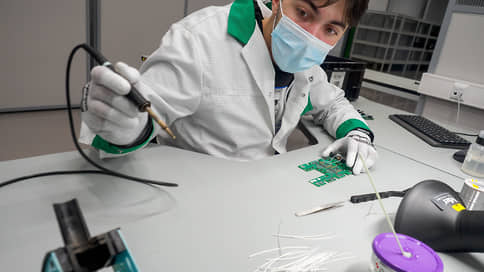Russian electronics manufacturers are asking the government for concessions
[ad_1]

Electronics manufacturers propose to the government to relax the requirements of the point system. They are concerned that from 2024, only Russian printed circuit boards are required to be recognized as domestic technology. Board manufacturers are able to provide only 10% of the civilian market. Yadro, GS Group and Beshtau are already planning to produce boards for themselves. But it takes several years to start and debug production.
According to two Kommersant sources in the IT market, on September 4, a meeting with Russian electronics manufacturers and component developers was held at the Ministry of Digital Development. Judging by the agenda, ANO Computing Technology (ANO VT), Aquarius, Yadro, F+ tech, Baikal Electronics, MCST were invited to the meeting. The parties, Kommersant’s interlocutors say, discussed the prospects for softening the current version of the scoring system, which determines the level of domestic radio electronics. The Mintsifra confirmed the fact of the meeting. MCST, Aquarius and Baikal Electronics declined to comment.
The point system is regulated by the 719th government decree. Electronics was included in the document in September 2021. The mechanism assumes that a company’s product must score a certain number of points (for example, for the use of Russian components) in order to be recognized as domestic. Year after year, the “passing score” should increase in order to motivate companies to deepen localization.
The Ministry of Industry and Trade noted that they are asking manufacturers of computer equipment “for the feasibility of meeting the requirements” of the resolution: “Based on the analysis of the information, additional work will be carried out, including with board manufacturers, to assess the possibility of meeting the needs.”
According to the interlocutor of Kommersant, who is familiar with the details of the meeting, Yadro and Aquarius are concerned that from 2024, not Chinese, but Russian printed circuit boards will need to be used for inclusion in the register, while there are not enough of them on the market.
Otherwise, companies will lose their advantages in public procurement. Therefore, they ask to freeze the current requirements.
But this opinion is not shared by all market participants. “Our position is not to make concessions to anyone. F+ tech is technologically ready to increase the localization of products, use Russian components and comply with the requirements that come into force on January 1, 2024,” said Mikhail Volkov, CEO of F+ tech.
The latest up-to-date data on the structure of the printed circuit board market that Kommersant managed to find is dated 2018 – this is the ARPE report. It follows from it that at that time the market volume was $282 million. The largest manufacturers were Rezonit, Technotech and Electroconnect. In the segments of single, small-scale and medium-scale production (the main consumers of such boards are military-industrial complex enterprises), Russian manufacturers occupied a significant share (71%, 50% and 30%, respectively). In large-scale production, the share of domestic companies was 13%, the rest was accounted for by imported boards.
Director General of the Consortium of Printed Circuit Board Manufacturers (Rezonit, Technotech, GS Group) Vladimir Semenov emphasizes that now board manufacturers are able to satisfy no more than 10% of the needs of the civil sector.
“Customers must understand that in order to master the new range and volumes in which they are interested, additional capacities and a comfortable investment environment are needed. We can’t do it right now,” he says.
Electronics manufacturers are ready to expand the production of printed circuit boards themselves. For example, Yadro is implementing a project in Dubna (the release date is not disclosed). In Beshtau Electronics, Kommersant was told that they expect to launch the “first stage of printed circuit board production” in the spring of 2024. A similar project is planned by GS Group, two interlocutors of Kommersant in the IT market say, according to them, the company is now trying to purchase equipment. GS Group did not respond to a request. According to a Kommersant source in a major electronics manufacturer, companies are asking to freeze requirements for printed circuit boards, just in time to launch their production. This, he estimates, takes about two years.
[ad_2]
Source link





